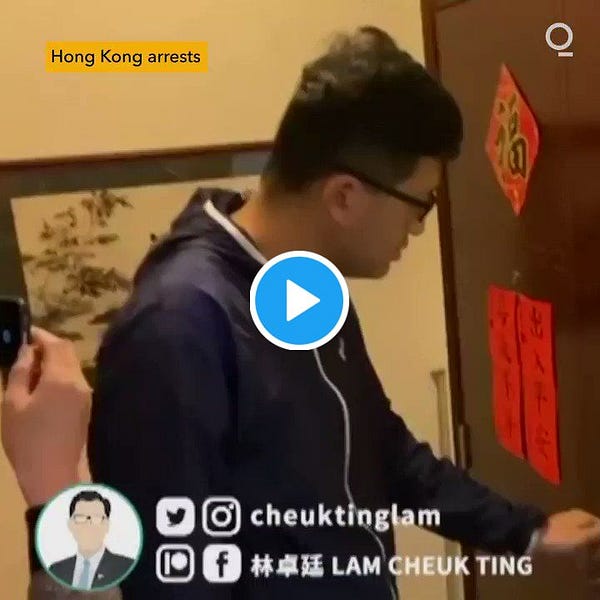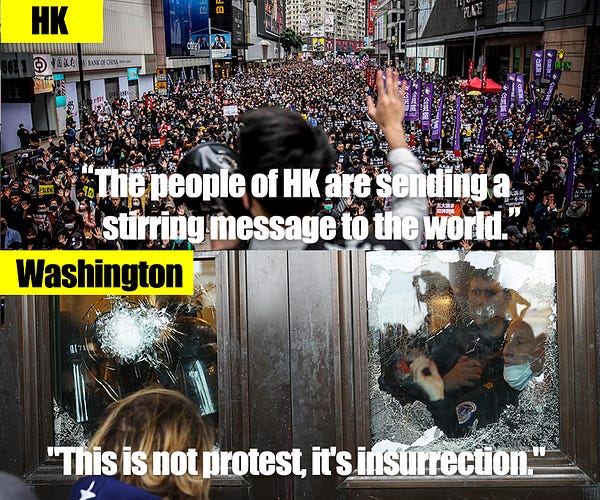Meanwhile in Hong Kong
Mass arrests leave Hong Kong stunned as China snatches at democratic freedoms
In a rush? No worries! The most important bits are in bold. Skim ahead!
In a major show of dominance, China executed the biggest crackdown on pro-democracy dissent Hong Kong has seen since Beijing imposed the national security law (NSL) last June. Over 50 Hong Kong residents were arrested early Wednesday, including former Legislative Council members, an American human rights lawyer, and several district councilors. Their charge? “Subverting state power” by organizing and participating in primary elections held in July, two weeks after the NSL took effect.


With over 170,000 organizers and 600,000 voters, the July primaries narrowed the field of pro-democracy opposition candidates who would run in September's general elections. The Liaison Office, Beijing’s main representative to Hong Kong promptly denounced the primaries, issuing a statement claiming that, “opposition groups and leaders have deliberately devised plans to hold this so-called ‘primary election,’ which is a serious provocation to the current electoral system and caused serious damage to the fairness and justice of the Legislative Council elections.” Authorities also began investigating the primaries, vowing to notify law enforcement if any illegal activity was found. Hong Kong Chief Executive Carrie Lam later postponed September elections by a year, over the coronavirus pandemic, angering the democratic camp who hoped to win a majority in the 70-seat legislative assembly.
Wednesday’s sweeping arrests fulfill law enforcement’s promise. Approximately 1,000 police officials raided 72 sites before dawn, arresting 53 residents and freezing $200,000 in related funds, announced Li Kwai-wah, a senior police superintendent, at a news conference. Six of the arrested were election organizers, and 47 were participants. The following day, prominent pro-democracy activist Joshua Wong was arrested for violating the NSL by participating in the election. Wong is currently already serving 13 and a half months for his role in the June 2019 protests. Wong’s team confirmed via Twitter that authorities took him from his prison to a detention center for questioning.


On Friday, however, all but one of the arrestees were released on bail. Law enforcement seized their passports, barring them from leaving the country and they are expected to report back to authorities early next month.
What is the National Security Law?

The vaguely worded NSL states that acts of secession, subversion, terrorism, and collusion with foreign or external forces can receive up to life imprisonment. But the law's flimsy framework leaves much to interpretation—Beijing’s interpretation. Under the law, new security offices run by Beijing can enforce laws and extradite cases to mainland China, wiretap and monitor suspicious individuals, allow Hong Kong’s chief executive to appoint judges to hear national security cases, and deem actions like damaging public transport facilities as terrorism.
But, for now, arresting people on assumptions is not really enough. Legal experts told the South China Morning Post that, “strong evidence was needed to make the subversion charges stick,” specifically a call to instigate violence or illegal funding activities. “Paralyzing the government by means that are lawful and without violence or threat of violence is not a crime,” said Legal scholar Simon Young Ngai-man, from the University of Hong Kong to SCMP.
The arrests, which came while the United States and the United Kingdom battled their own political and health battles, displays an increasingly emboldened China. Veteran activist Lee Cheuk-yan explained to The Guardian that the purpose of the crackdown is twofold. “One is to continue putting fear in the minds of the people so they can rule by that fear. And the second is to wipe out any opposition in Hong Kong who might try to challenge them.”
The steady escalation

In November, authorities removed four democratic opposition lawmakers deemed “unpatriotic” from the legislative council. In protest, the council’s remaining opposition lawmakers resigned, leaving the 70-people assembly filled exclusively with pro-Beijing lawmakers. The move effectively eliminated the “one country two systems” principle Hong Kong and China operated under. Furthermore, under the NSL, many pro-democracy advocates now have criminal records, barring them from joining running for public office.
Several activists, politicians, and journalists have also been arrested. Joshua Wong was arrested in December for organizing demonstrations outside police headquarters in June of 2019, during the early days of the massive protests against an extradition bill. Popular activists Agnes Chow and Ivan Lam were arrested for unlawful assembly in 2019 but are serving a shorter prison sentence than Wong. Other activists like Nathan Law fled Hong Kong. Law now resides in the UK.
In December, the media tycoon and owner of pro-democracy newspaper Apple Daily, Jimmy Lai, was denied bail after being charged with fraud and foreign collusion in August. Last week, the court ruled he would return to jail and remain there until at least February. When they are not the target, journalists are often coerced to give up information to authorities. On many occasions, including Wednesday’s raid, police demand information about activists, and other persons of interest, from news organizations.
"The Hong Kong government is shredding what remains of its once-famous tradition of press freedom by forcing news organizations to produce information connected to the government’s subversion case against democracy proponents," Committee to Protect Journalists Asia program coordinator Steven Butler said in a statement.
A speechless Hong Kong?
The arrests sent shockwaves through Hong Kong. ‘If running for office and trying to win election are considered subversion, then the security law “is aimed at the total subjugation of Hong Kong people,”’ said Victoria Hui, an associate professor of political science at the University of Notre Dame who studies Hong Kong, to The New York Times.
“The whole pro-democracy camp was eradicated by the Beijing government, totally crushed,” said Sunny Cheung, a candidate in the primaries who has since fled Hong Kong. He told The Guardian he is,” really concerned about the future of activism. You can’t really fulfill the responsibility of being a lawmaker anymore. You can’t dare to oppose anything, there can only be obedient lawmakers.”
Wednesday’s round up revealed authorities are targeting low-profile dissenters as well. American lawyer, John Clancey, is the chairman of the Asian Human Rights Commission. He was also the treasurer for a group that organized the primaries. Proof that a foreign passport does not exempt you from the NSL, he delivered a message to Hong Kong as he was escorted into a police car: “Continue to work for human rights and democracy in Hong Kong.”
Jeffery Andrews, a social worker of Indian descent, and Lee Chi-yung of the Association of Parents of the Severely Mentally Handicapped were also among the arrested. Although both ran in the primaries, Andrews’ platform centered around helping ethnic minorities and promoting racial harmony in Hong Kong. “His participation in the primaries is reflective of his commitment to Hong Kong...It was not an act of subversion,” read a statement from NGO Hong Kong Unison. Lee’s campaign focused on increasing accessibility in the region, in memory of his late daughter who used a wheelchair throughout her life.
The U.K, Australia, Canada, and the U.S condemned the arrests, with U.S. Secretary of State Mike Pompeo declaring that Washington may impose sanctions on those involved. But in light of the failed coup seen in Washington last week, China is reveling in the chance to chastise its American counterpart. “We hope that the American people can enjoy peace, stability, and security as soon as possible,” China Foreign Ministry spokeswoman Hua Chunying was cited in state media on Thursday. Chinese state-run news outlets were also quick to call out U.S. lawmakers who previously expressed support for protesters who broke into Hong Kong’s legislature in 2019.





Go Deeper: A Hong Kong Website Gets Blocked, Raising Censorship Fears



